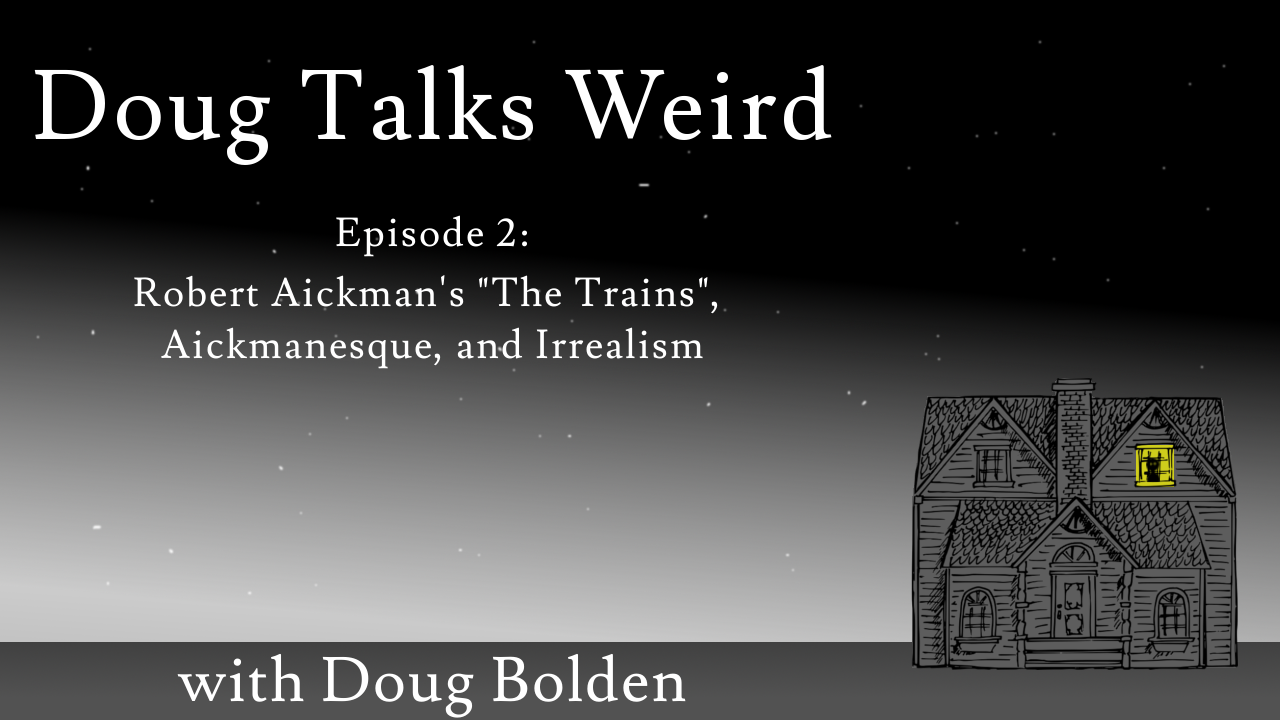Summary: I have posted the second episode of Doug Talks Weird, this one dealing with an Robert Aickman story along with the concepts of Aickmanesque and Irrealism. Still goes on a bit long, but I think I like this even more than the first.
Some additional notes/commentary about Doug Talks Weird 2: Robert Aickman's The Trains, Aickmanesque, and Irrealism
BLOT: (02 May 2015 - 10:47:11 AM)
Some additional notes/commentary about Doug Talks Weird 2: Robert Aickman's The Trains, Aickmanesque, and Irrealism
Couple of nights ago, posted the second video in my Doug Talks Weird series. This video looks at Robert Aickman's "The Trains", as well as the concept of what makes a story "Aickmanesque" and/or gives it a flavor of irrealism. You can watch the video by clicking the "thumbnail" below, the first link, above, or see it embedded at the bottom.
Wanted to take a moment and fill in some more blanks and give some additional commentary. I dug around a little online to find out how other people identified "Aickmanesque". Anecdotally, it seems to be considered a phrase tied to the inexplicable, though Brian J. Showers points that out there's more to it than "an oblique and impentrable ending" (that's about al he says about Aickman in the inteview, but it's a good interview). The Curious Tale's blogpost about
Almost humorously, to me, though I discuss the puzzling nature and the trouble of applying a single definition to an Aickman story, when I was searching for my own definition of Aickmanesque, I seem to have focused more on the practical. It is not that I disagree with much of the above (though I think a lot of it, like a lot of the critique of Ligotti, misses out on the humanity of the situation), it is simply that most of those definitions could be equally applied to the later stories of M.R. James (stuff like "Story of a Disappearance and a Reapparance," I mean) or to the stories of Edward Lucas White. Reggie Oliver (and Ramsey Campbell, and Laird Barron, and so on) has many of those qualities in his stories, but I would not say that their stories are fully Aickmanesque, merely that they tap into the same vibes, presumably on purpose. Some of my more specific elements include:
- Lonely, dislocated characters (with literal dislocation (i.e. travel) being common)
- People usually of means, but maybe who have seen better (wealthier) days
- Sexual confusion
- Enhanced differences between genders
- Confusion between literal and figurative states
- Narrative lacunae
I did not go too much into a formal definition of "narrative lacuna", because I have not had much luck finding one. People seem to use the term in relation to their own definition.
I did, however, go into a more formal definition of Irrealism, which can be dangerous. As a literary critique, it seems almost a little too new to have full staying power, but I find several of the articles about it, such as those in
Another book I quoted from, Gary William Crawford's
The story is so subtle and "elliptical" to use Ramsey Campbell's term, that it is difficult to say precisely what happens in it. Yet Aickman creates an intensely frightening tale...[snipped section includes a summation of the story and gets a few details off by my reckoning, but I'll leave that up to the those who have read the story to decide]...But these events are filtered mainly through Margaret's perceptions, so it is very difficult to say which is dream or which reality...As in dreams and poems, the truth is presented metaphorically: Roper's home and "The Quiet Valley" are analogues of hell. For no reason, Margaret finds herself caught up in it, and this punishment, as in "The Inner Room," appears quite unjust.
[Crawford, Gary Williams. ROBERT AICKMAN: AN INTRODUCTION (Kindle Locations 835-852). Ash-Tree Press. Kindle Edition.]
If you want some other critique on "The Trains", there is quite a bit. A longer one that goes into a number of issues and ideas is Brendan Moody's "Blood and Iron: Robert Aickman's 'The Trains'". In the 24th issue of
By the way, I meant it about
Alright, onto the video. The next full episode will be on Thomas Ligotti's "The Frolic" and will deal with the question, "What's a Lovecraftian?"
UPDATE: Tartarus Press will be publishing a collection of previous uncollected Aickman short fiction, non-fiction, poetry, and fragments. I'm excited, in relation to this post, because it will show some early stories/fragments building up to Aickman's style. Also it will include a documentary.
OTHER BLOTS THIS MONTH: May 2015
dickens of a blog




Written by Doug Bolden
For those wishing to get in touch, you can contact me in a number of ways

This work is licensed under a Creative Commons Attribution-ShareAlike 3.0 Unported License.
The longer, fuller version of this text can be found on my FAQ: "Can I Use Something I Found on the Site?".
"The hidden is greater than the seen."


